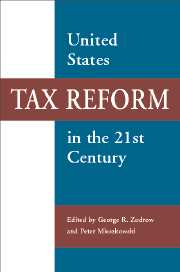Book contents
- Frontmatter
- Contents
- List of Contributors
- Preface
- 1 Introduction: The Fundamental Question in Fundamental Tax Reform
- 2 Behavioral Responses to a Consumption Tax
- 3 The Economic Impact of Fundamental Tax Reform
- 4 Capital Income Taxation in Tax Reform: Implications for Analysis of Distribution and Efficiency
- 5 International Aspects of Fundamental Tax Reform
- 6 Distributive Analysis of Fundamental Tax Reform
- 7 The Role of Administrative Issues in Tax Reform: Simplicity, Compliance, and Administration
- 8 Evaluating the National Retail Sales Tax from a VAT Perspective
- 9 Transitional Issues in the Implementation of a Flat Tax or a National Retail Sales Tax
- 10 Historical and Contemporary Debate on Consumption Taxes
- 11 The Politics and Ideology of Fundamental Tax Reform
- Bibliography
- Index
9 - Transitional Issues in the Implementation of a Flat Tax or a National Retail Sales Tax
Published online by Cambridge University Press: 23 October 2009
- Frontmatter
- Contents
- List of Contributors
- Preface
- 1 Introduction: The Fundamental Question in Fundamental Tax Reform
- 2 Behavioral Responses to a Consumption Tax
- 3 The Economic Impact of Fundamental Tax Reform
- 4 Capital Income Taxation in Tax Reform: Implications for Analysis of Distribution and Efficiency
- 5 International Aspects of Fundamental Tax Reform
- 6 Distributive Analysis of Fundamental Tax Reform
- 7 The Role of Administrative Issues in Tax Reform: Simplicity, Compliance, and Administration
- 8 Evaluating the National Retail Sales Tax from a VAT Perspective
- 9 Transitional Issues in the Implementation of a Flat Tax or a National Retail Sales Tax
- 10 Historical and Contemporary Debate on Consumption Taxes
- 11 The Politics and Ideology of Fundamental Tax Reform
- Bibliography
- Index
Summary
Proposals for replacing the existing income tax with some form of consumption-based taxation, especially various versions of the Hall and Rabushka ([1985] 1995) flat tax or a national retail sales tax (NRST), have been the focus of much recent discussion in both the political and academic arenas. The debate regarding the desirability of such “fundamental tax reform” in the United States has proceeded in many dimensions. In particular, there is a large literature on the relative merits of income-based and consumption-based taxes, as well as on the relative advantages and disadvantages of direct or individual and firm-based taxes like the flat tax and indirect or transaction-based taxes like the NRST. These issues are not revisited in this study. Instead, the analysis focuses on an issue that arises often in the discussion of fundamental tax reform – the transitional problems associated with moving from the current income-based tax system to a consumption-based tax, especially the tendency of such a reform to impose a onetime windfall loss on the owners of existing capital.
Concerns about transitional problems have long been an impediment to fundamental tax reform. In particular, the U.S. Treasury (1984a) cited transitional issues as one of the primary reasons that consumption-based taxes were not seriously considered in the process that led to the Tax Reform Act of 1986. More generally, Pearlman (1996, p. 395) observes that in legislative discussions of tax reform it is often the case that “attention is refocused entirely to the design of politically acceptable transition relief, depriving substantive changes of adequate analysis.”
- Type
- Chapter
- Information
- United States Tax Reform in the 21st Century , pp. 245 - 283Publisher: Cambridge University PressPrint publication year: 2002
- 5
- Cited by



